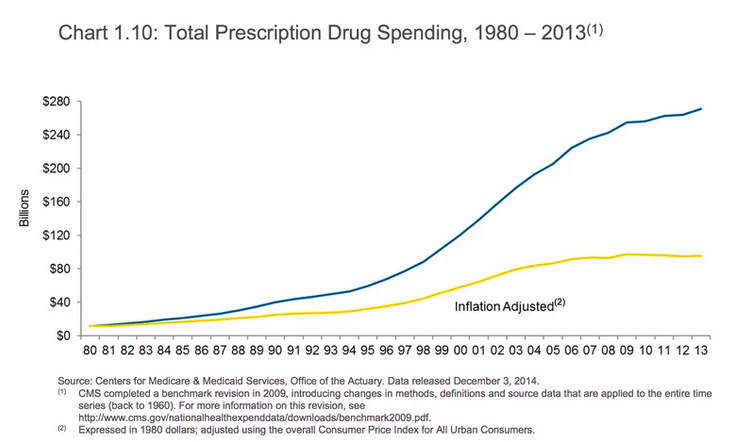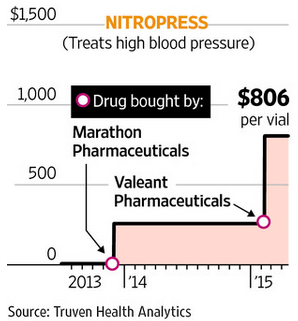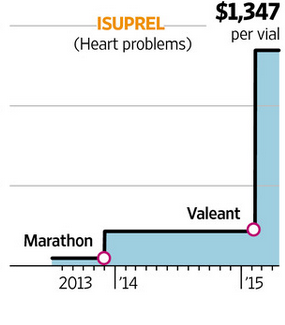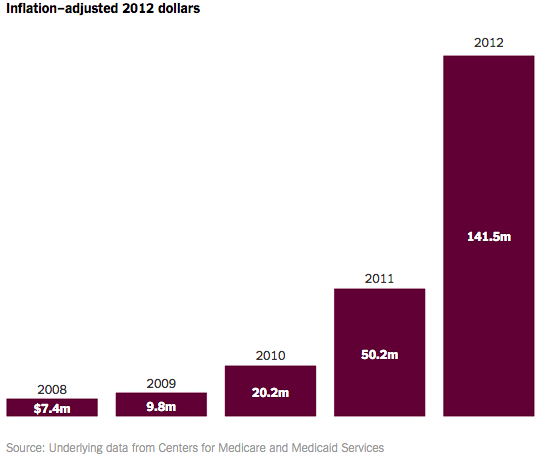These Drugs Expose the Troubling Culture of Drug Pricing
By:
A lot of attention has been devoted to the details of pharmaceutical drug pricing, after the company Turing raised the price-per-pill of a 62-year-old drug exponentially overnight, earlier this week
Martin Shkreli, the founder and CEO of Turing Pharmaceuticals later reversed the price hike of Daraprim, a life-saving medication used to treat weakened immune systems, but only after immense pressure spurred by caustic public feedback. After purchasing Daraprim, Turing bumped the price from $13.50 to $750 per pill.
RELATED: Donald Trump Slams Martin Shkreli At Press Conference
Daraprim's sudden price hike was an—albeit excessive—example of a broader trend that has seen prescription drug prices increasing ahead of inflation rates in recent years.
 American Hospital Association - aha.org
American Hospital Association - aha.org
Related: Martin Shkreli, Turing Pharmaceuticals CEO, Destroyed In One Meme
Various states have considered legislation that would force drug manufacturers to disclose their reasons for raising prices, and some 2016 White House candidates have introduced plans to address soaring costs—this week, the Shkreli scandal proved a good springboard.
The public's disgusted reaction to Skreli's display may be one one of the biggest takeaways when it comes to reevaluating this particular branch of U.S. healthcare, encouraging an inward look at increasingly expensive, necessary, life-saving drugs. Here are some other recent examples of medication price hikes.
1 and 2. Nitropress and Isuprel
Two drugs, one to treat high blood pressure, the other for heart problems, both saw significant increases—525 and 212 percent—after being purchased by Valeant Pharmaceuticals earlier this year.
 Wall Street Journal - wsj.com
Wall Street Journal - wsj.com Wall Street Journal - wsj.com
Wall Street Journal - wsj.com
3. Cycloserine
This week, it was reported that the medication used to treat drug-resistant tuberculosis had been returned to a previous owner after the price for 30 capsules had increased by around 2,000 percent—from about $500 to $10,800 overnight. Cycloserine was acquired by Rodelis Therapeutics last month, but was returned to Chao Center. The price increase was also rescinded.
4. Xyrem
The sleeping drug was acquired a decade ago by Jazz Pharmaceuticals, whose revenue from Xyrem increased by roughly $750 million since then, NBC reports. The drug's cost has reportedly increased an average of nearly 30 percent each year since 2011.
5. Acthar
The drug that treats spasms in infants and some symptoms of multiple sclerosis in adults was created around the same time as Daraprim, and it has also experienced significant price hikes in recent years. According to the New York Times, the Questcor company increased the drug's price in 2007 from $1,650 per vial to $23,000 overnight. Here's a chart that reflects Medicare spending on the drug:
 New York Times - nytimes.com
New York Times - nytimes.com
Why this happens.
Rising prices have affected both newer specialty medication, as well as older generic, supposedly affordable drugs. According to one AARP study, retail prices for brand name medication used by older Americans went up 13 percent in 2013. And the prices of nine Multiple-sclerosis drugs reviewed in the journal Neurology increased five to seven percent times higher than prescription drug inflation. Drug pricing schemes have many influences, including research and development, testing, and negotiating with insurance companies—the government has virtually no control over pricing. As Wired's Nick Stockton described it, pricing essentially "boils down to three things: How many patients the drug will treat, how many similar drugs are on the market, and how much a drug improves a patient's life." Those factors build into a "perceived market value," which, with a drug like Daraprim, is high. Stockton continues: "It treats [a] small part of the population, it's the only toxoplasmosis drug on the market, and it saves lives. Cha-ching."
